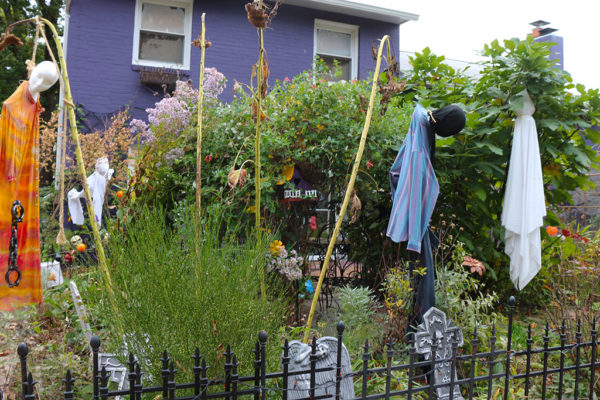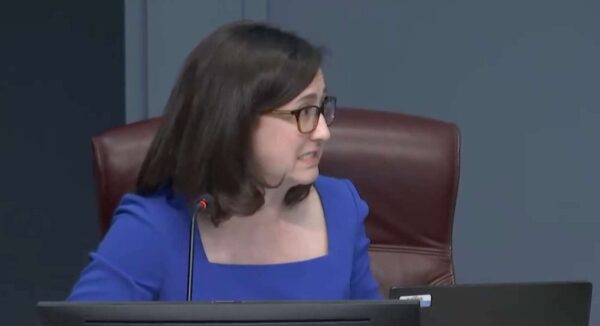
One person’s weed is another’s protected native species.
Arlington naturalists argue that local ordinances do not distinguish the two, leaving neighbors who have certain native species that can be mistaken for weeds in their gardens prone to visits from the county’s code enforcement division.
“We’re sending incredibly mixed messages,” Caroline Haynes, a member of the Arlington County Forestry and Natural Resources Commission, told the Arlington County Board last Tuesday.
She and two other citizen commissions representatives asked the County Board to adopt wording to protect people from complaints that their gardens are unruly. FRNC Chair Phil Klingelhofer says the current language, which focuses on the height of weeds, dates back to the 1950s.
“Those who wish to plant native plants and thereby bring the benefits we all know come from that planting structure are disadvantaged by this holdover from a different era,” Klingelhofer said.
This hit close to home for County Board member Takis Karantonis, who received a visit from code enforcement over a Virginia thistle he let grow to six feet tall.
“[The thistle] made a difference in the environment, but for some people, this was really offensive to their aesthetics,” he said.
This discussion arose during Board deliberations about approving technical changes to the ordinance intended to strengthen the county’s ability to enforce violations such as weeds on commercial properties. Rather than address the issue on Tuesday, the County Board decided to move defining weeds to an ongoing update to the Forestry and Natural Resources Master Plan.
But Haynes said Arlington has punted on defining what a weed is for long enough.
“I would just like to acknowledge that while we’ve been wringing our hands about this for the past 10-15 years, other jurisdictions have also adopted policies that promote native landscaping and conservation landscaping and have also managed to update their ordinance,” Haynes said. “Arlington hasn’t been able to do that. How difficult can this possibly be?”
Representatives from code enforcement said the division is out of its depth.
“We are a bunch of architects and engineers and public safety professionals. We don’t know anything about weeds, vegetation or what have you. What resources do I have to determine if it’s a [native] species?” said Inspection Services Director Shahriar Amiri during the meeting. “We are not horticulturalists.”
Ultimately, the County Board decided to approve the technical changes adding in wording about weeds. The newly adopted changes are aimed at holding commercial property owners accountable for cutting grass and weeds and maintaining lawns. County staff requested the changes to provide relief to the code enforcement division, which has recently struggled to get some landowners to maintain their properties.
County Board Vice-Chair Libby Garvey made assurances she will bring up the issue this summer if it is not addressed through the Forestry and Natural Resources Plan update. Arlington County projects a final draft, responding to public comments gathered late last summer, will be released and reviewed by citizens commissions and the County Board this spring.
“How many master plans do we need to adopt before this issue is addressed?” Klingelhofer asked.
Karantonis echoed their sense of urgency, predicting more people will choose natural landscaping for its benefits, including flood mitigation.
“The number of complaints… is a function of how many of these landscapes exist,” he said. “The moment they become prevalent — I have seen it with my own eyes — there is controversy in the community. Some people think their property values are affected by that, the general appearance of the street, the general appearance of their neighborhood — the character of the neighborhood, from a different point of view.
Board Chair Christian Dorsey questioned how often clashes like this happen, observing he sees “lots of naturally managed landscapes that seem to be quite thriving.”
He, Garvey and Karantonis urged staff to improve record-keeping so they could track reports of less manicured vegetation as well as their outcomes. Dorsey concluded that changing the definition of a weed will not mollify concerned neighbors.
“[If] your neighbors don’t like you, Mr. Karantonis, they’re going to be upset with your landscape regardless of whether or not the code indicates that it’s proper,” he said. “I don’t think we can stop people from complaining. What we can do is have concern over whether or not those complaints result in any actionable jeopardy and we have not been able to determine that actually happens.”
Board member Katie Cristol said the forestry plan update is a better avenue because there will be time to solicit more, and opposing, opinions.
“I’m very optimistic that this can happen and I look forward to having, maybe this summer, some ordinance reforms in addition so that this Board doesn’t have to get into the weeds,” said Cristol, grimacing at her pun before breaking into laughter.
“Really? Really? Dismissed,” Dorsey said, laughing and banging his gavel.


